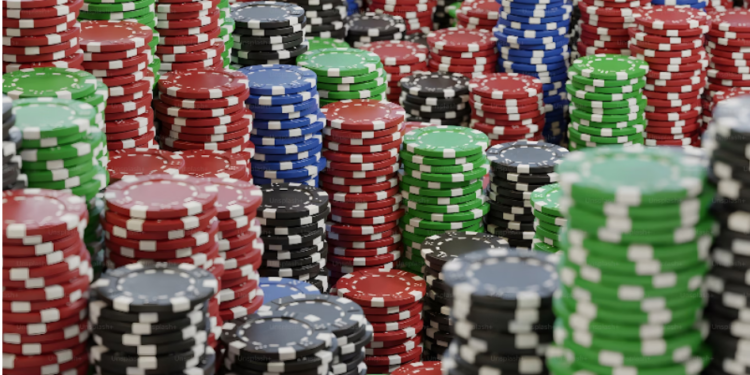When stepping foot into the thrilling environment of a casino, players often dream of hitting it big, fancying chances at the myriad of games on offer. Roulette wheels spin, cards shuffle, and slot machines chime with promises of fortune. However, each of these games comes with an underlying mathematical advantage designed to ensure that over time, the establishment retains a profitability margin. This advantage is known as the house edge, a term any gambler will encounter when delving into the world of betting. To both amateur and seasoned punters, understanding this concept is not just beneficial – it’s crucial for an informed gaming experience knowing the house edge can empower players to make smarter decisions, enhancing their overall experience, much like how Royal Fortune Casino provides a transparent gaming environment, offering players the best odds and fair play for a thrilling casino journey.
The house edge can be defined as the casino’s average profit from a player’s bet. It ensures that in the long run, the house does not lose money to players but rather, gains a predictable revenue. The edge is present in every game, although it varies both from game to game and from bet to bet within the same game. Essentially, the house edge is the price we pay for the entertainment and the possibility of winning a prize.
House Edge Explained
At its core, the house edge is a simple percentage representing the casino’s expected gain. For example, a game with a 2% house edge means that for every $100 wagered, the casino expects to make a profit of $2 in the long run. This “long run” is a statistical concept, indicating the outcome after many rounds of play where variance has leveled out.
It’s important to note that short-term luck can and does occur, which means that players can win—and sometimes win big—despite the house edge. Conversely, they can lose more than the expected percentage. But as the number of bets placed increases, the actual results will inch closer to the statistical expectation.
The Role of Probability
To understand the house edge, one must first grasp the basics of probability. Every game outcome has a certain likelihood of occurring, dictated by the rules of the game and often by physical properties (like the layout of numbers on a roulette wheel). The house edge is directly tied to these probabilities. By paying out at odds slightly lower than the true odds of winning, the casino ensures a profit margin.
Let’s consider the European roulette as an example. The wheel has 37 pockets with 18 red, 18 black, and one green zero. A bet on a specific number pays out at 35 to 1, but the true odds of the ball landing on that number are 1 in 37. This discrepancy is where the casino gains its edge.
Calculation of House Edge
The house edge is typically calculated using the following formula:
House Edge = (Probability of Winning) * (Payoff Odds) – 1
To break even without a house edge, the payoff odds would have to exactly match the inverse of the probability of winning. In most games, because this isn’t the case, the equation will yield a negative number, which is the house edge.
Games and Their House Edges
Different casino games have different house edges, and savvy players will seek out games and bets that offer the lowest house edge. Here’s a table that provides a snapshot of common games and their typical house edge percentages:
| Game | House Edge Range |
| Blackjack | 0.5% to 2% |
| Craps | 1.4% to 5% |
| Baccarat | 1.06% to 1.24% |
| European Roulette | 2.7% |
| American Roulette | 5.26% |
| Slot Machines | 2% to 10% |
| Keno | 20% to 30% |
| Video Poker | 0.5% to 5% |
Strategies to Mitigate House Edge
There are strategies that players can use to mitigate the house edge:
- Learn Basic Strategy: In games of skill like blackjack, learning and using basic strategy can reduce the house edge considerably.
- Choose the Right Games: Opt for games that inherently have a low house edge, like baccarat or European roulette.
- Play the Best Bets: Within games, choose bets with the lowest house edge. In craps, for instance, the pass line bet has a much lower edge than the any seven bet.
- Avoid Side Bets: Many side bets have a significantly higher house edge than the main game.
- Bankroll Management: Set limits for your losses and stick to them.
- Take Advantage of Bonuses: Casino comps and bonuses can provide extra value, reducing the effective house edge.
Conclusion
The house edge is an essential facet of the gambling world, ensuring casinos turn a profit and can continue offering games to the public. It affects every game and every player, regardless of whether they’re aware of it. By understanding this component, players can choose games wisely, adopt strategies that reduce the edge, and manage their bankrolls effectively, hence enhancing their overall gaming experience.
Armed with the facts and figures from tables and strategic know-how from lists, smart players can approach the casino landscape not only with heightened excitement but also with the confidence that comes from knowing the mechanics behind their entertainment. The house may always have the advantage, but a player with understanding stands the finest chance of walking away as a winner, or at least having a great time while sticking to their budget.
Do you have a story in your community or an opinion to share with us: Email us at editorial@watchdoguganda.com













